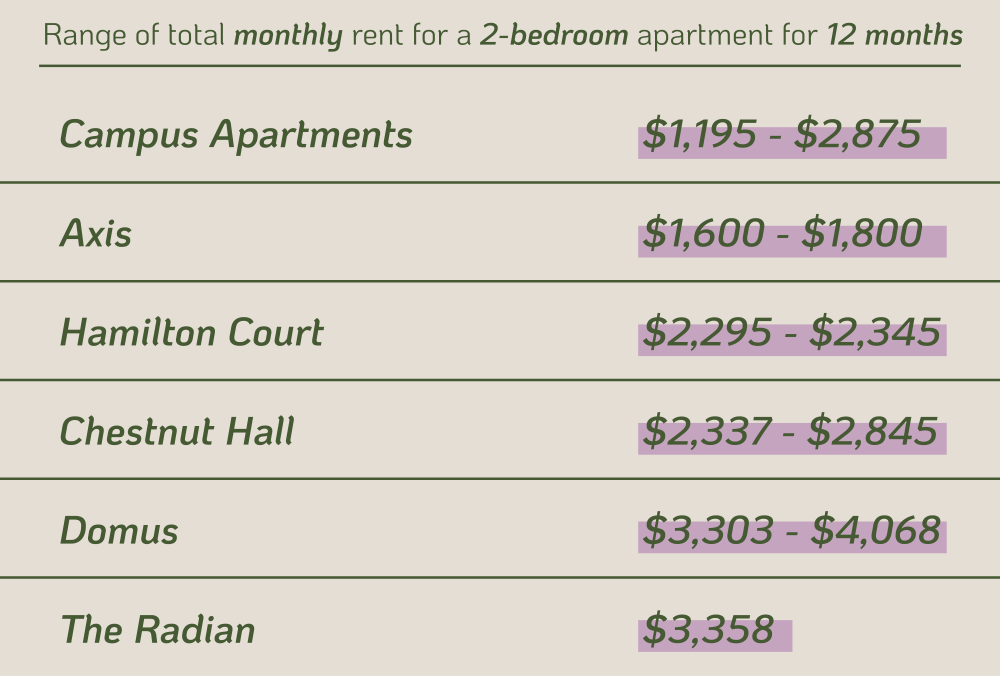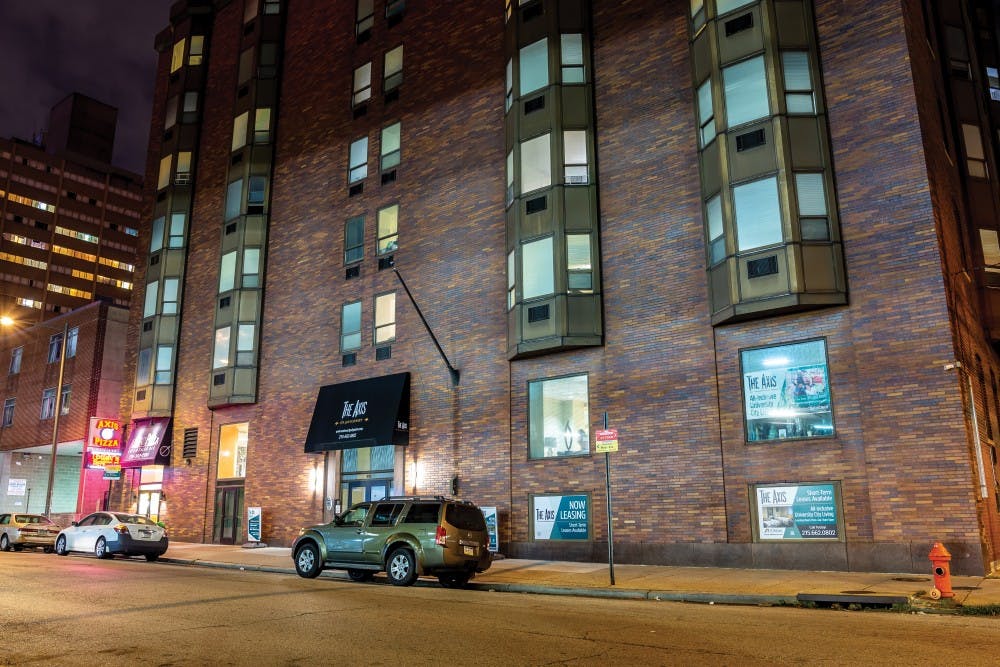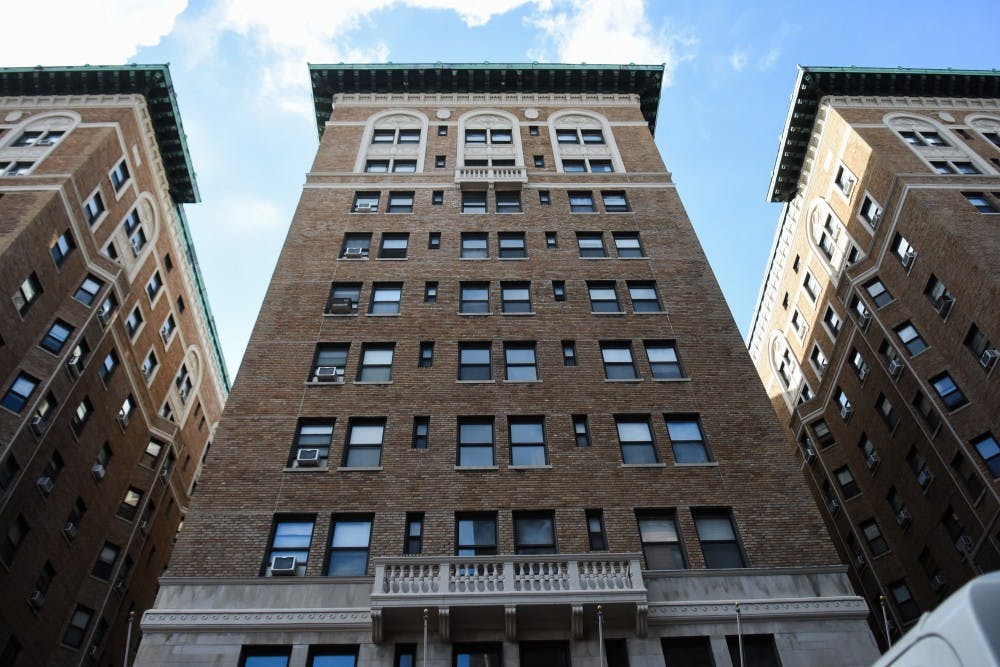
Moving off campus is fairly common for upperclassmen at Penn — in 2017, spokesperson for Penn Business Services Division Barbara Lea-Kruger said 71 percent of juniors and 77 percent of seniors live in off-campus housing. But the process of moving off campus can often be confusing and challenging to navigate, especially when dealing with factors like financial aid.
Along with our other Housing Guide 2018 content, The Daily Pennsylvanian has put together a guide specifically to help with moving off campus.
Off-campus housing options
Around Penn's campus, there are a number of leasing companies and apartment buildings tailored to students, including Campus Apartments, University Enterprises, The Radian, Hamilton Court, and Chestnut Hall.
The different options can vary greatly in cost, timeline, and amenities, which are all important details to consider when moving off campus.

Critics argue that Penn's decision that sophomores will be required to live on-campus starting in 2021 would limit options and force first-generation, low-income students into more expensive on-campus living.
Pricing

Pricing for off-campus living differs greatly, with some options substantially less expensive than living on campus and others more expensive.
An important factor to consider when moving off campus is the length of leases. While on-campus housing is limited to the nine months of the school year, almost all off-campus leases run for 12 months. This means students need to consider the added difficulty of finding someone to sublet for the summer or of footing the bill for an extra three months.
Many off-campus apartments charge for utilities separately from rent, which can greatly change the cost. While some have a flat fee, like The Radian, which charges $70 per month for utility/amenity, many apartments and houses have utility costs that are based on usage.
Another aspect of living off campus that can influence cost is furniture. Many apartments will come unfurnished, and it's important to keep in mind the added price of buying furniture.
Some apartments buildings offer furniture rentals, but it's often cheaper to buy furniture from IKEA or from someone on Free & For Sale. However, those options require getting the furniture to the apartment, possibly assembling it, and then reselling it at the end of the year.
Financial aid
According to the University’s off-campus financial aid page, “students receive financial aid based on an assessment of off-campus living expenses in the Philadelphia area.” The page notes that financial aid packages are only for the school year, so the school would only cover nine months of housing, even though many off-campus leases are for 12 months.
For the 2018-2019 school year, SFS offers up to $9,351 for students living off campus, as opposed to the $10,200 for students living on campus.
These discrepancies, as well as the University’s policies on the timing and logistics of financial aid, can often complicate the process of moving off campus.

The Axis
Timeline
The timeline and process for applying for housing varies by leasing company. Many companies have already opened their applications for the 2019-2020 school year, though they will remain open for months.
Nursing junior Mikayla Joseph lived in off-campus housing during her sophomore year and said she was able to wait until May of her freshman year to finalize her housing in the apartment complex.
This year, she lives in a house right off campus, and she found that the timeline for finalizing the lease was quite different — she had to sign by October 1.
“It’s hard to live in a house sophomore year because you have to figure that out so early in the year,” she said.
Many students looking to live in off-campus apartment buildings experience similar pressure from the leasing companies to secure housing as early as possible.
Amenities
One advantage of moving off campus is the amenities that off-campus housing can offer over Penn's options. Many apartment buildings have gyms, lounges, and even pools open to residents. Off-campus housing also has the added freedom of living in a PennCard-free building, without the oversight of an RA or GA, and sometimes with the possibility of pets.

Chestnut Hall
Why do people decide to move off campus?
People's reasons for moving off campus can differ greatly, from it being a cheaper option than on-campus housing to higher quality living with greater freedom. For Joseph, having a kitchen was the greatest motivating factor.
“I need to be able to have a kitchen, especially with nursing because we have to get up really early for clinicals,” she said.
Price was also a strong motivator in her move off campus. “I pay a lot less money to live somewhere nicer than [I would] on campus,” she said.
For College senior Dakota Jones, cost was the deciding factor. “I’m paying significantly less in rent, even if you factor in utilities [and the] security deposit,” he said. “I ended up saving like $2,000 a year by moving off campus versus living in a high rise.”
Many campus groups have off-campus houses, and the community this provides can also be a strong motivator. College sophomore Evan McClelland is a member of the Penn Glee Club and lives in the group’s house.
“That it was a social hub was really the main selling point for me,” he said.
McClelland also finds that living off campus provides some stress relief. To him, being on campus for school, leaving campus to go home, and having those “two distinct, separate spheres is definitely a good feeling.”
The Daily Pennsylvanian is an independent, student-run newspaper. Please consider making a donation to support the coverage that shapes the University. Your generosity ensures a future of strong journalism at Penn.
Donate







